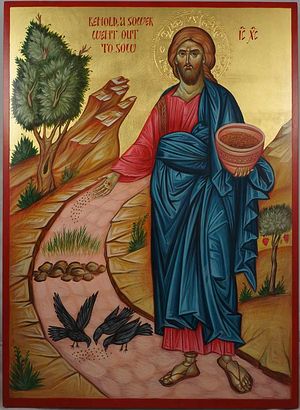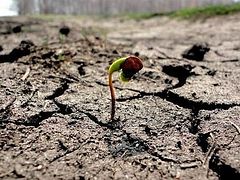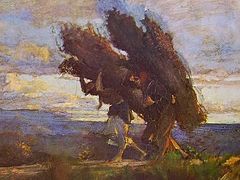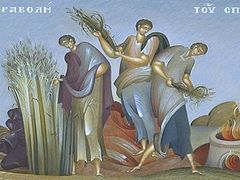 Photo: zhilinolub.cerkov.ru The Lord spoke this parable: “A sower went out to sow his seed. And as he sowed, some fell by the wayside; and it was trampled down, and the birds of the air devoured it. Some fell on rock; and as soon as it sprang up, it withered away because it lacked moisture. And some fell among thorns, and the thorns sprang up with it and choked it. But others fell on good ground, sprang up, and yielded a crop a hundredfold.” When He had said these things He cried, “He who has ears to hear, let him hear!”
Photo: zhilinolub.cerkov.ru The Lord spoke this parable: “A sower went out to sow his seed. And as he sowed, some fell by the wayside; and it was trampled down, and the birds of the air devoured it. Some fell on rock; and as soon as it sprang up, it withered away because it lacked moisture. And some fell among thorns, and the thorns sprang up with it and choked it. But others fell on good ground, sprang up, and yielded a crop a hundredfold.” When He had said these things He cried, “He who has ears to hear, let him hear!”
Then His disciples asked Him, saying, “What does this parable mean?”
And He said, “To you it has been given to know the mysteries of the kingdom of God, but to the rest it is given in parables, that ‘Seeing they may not see, And hearing they may not understand.’
Now the parable is this: The seed is the word of God. Those by the wayside are the ones who hear; then the devil comes and takes away the word out of their hearts, lest they should believe and be saved. But the ones on the rock are those who, when they hear, receive the word with joy; and these have no root, who believe for a while and in time of temptation fall away. Now the ones that fell among thorns are those who, when they have heard, go out and are choked with cares, riches, and pleasures of life, and bring no fruit to maturity. But the ones that fell on the good ground are those who, having heard the word with a noble and good heart, keep it and bear fruit with patience.” (Luke 8:5-15)
Seeds are not magical dust that bring about some magical change in the soil itself. Rather, seeds are the potential life of any species that must interact with the conditions around them to produce life. Seeds are thus relational things, just like us humans, and in fact like all things on earth. The seeds are dependent on other forces to move them through the world to a place where they might germinate, grow and bear fruit. Those forces can be things like animals or humans, or wind or water, but seeds have no ability to propel themselves. They are dependent on these other forces. And the seeds cannot germinate, grow and bear fruit unless they have proper soil conditions, sufficient water, nutrients, air and sunlight. Seeds are very dependent on the conditions around them to succeed in their purpose.
So it is fascinating that our Lord Jesus in explaining His parable says that “The seed is the word of God.” For Christ is acknowledging that the Word of God needs something in this world to carry it out into the world, and needs the conditions of the world to germinate, grow and bear fruit.
The Word of God is not a physical seed but a spiritual one. Still, it needs to be in relationship with other things in creation to accomplish its mission. In fact, God has entrusted to the Christian people the mission of planting the Word of God in our own hearts as well as in the hearts of others. We are responsible for transporting those seeds, and planting them and nurturing them so that the Word of God can bear fruit. Just as God could not become human without Mary to be His mother, so too God’s Word will bring forth fruit in creation only if we are willing to be the good soil in which this can happen.
And according to Christ’s teaching, we don’t have to pray that God will give us more seeds. It is not the lack of seed which is even a problem for us. When it comes to the Word of God, it is not the quantity of seed which brings about the abundant harvest.
“What is the kingdom of God like? And to what shall I compare it? It is like a grain of mustard seed which a man took and sowed in his garden; and it grew and became a tree, and the birds of the air made nests in its branches.” (Luke 13:18-19)
For even if we accept but one grain of seed and keep it in our hearts, it will bear fruit for God – both spiritual and physical. For God cares not just about our souls but always also about our bodies and the world we live in.
“For as the rain and the snow come down from heaven, and return not thither but water the earth, making it bring forth and sprout, giving seed to the sower and bread to the eater, so shall my word be that goes forth from my mouth; it shall not return to me empty, but it shall accomplish that which I purpose, and prosper in the thing for which I sent it. “For you shall go out in joy, and be led forth in peace; the mountains and the hills before you shall break forth into singing, and all the trees of the field shall clap their hands. Instead of the thorn shall come up the cypress; instead of the brier shall come up the myrtle; and it shall be to the LORD for a memorial, for an everlasting sign which shall not be cut off.” (Isaiah 55:10-13)
What God’s seed needs is good soil, and it is in that good soil that the seed will come to fruition and bring about an abundant harvest. But again it is not the quantity of seed which is important, for even one seed of God’s Word if it takes root in our hearts will yield an abundance of the fruits of the earth.
Christ’s explanation of the parable of the sower ends (vs 15) with Him comparing the good soil to “a noble and good heart” or a heart which is filled with beauty. That kind of heart keeps the Word of God and then bears fruit “with patience.” We have to cultivate our hearts to be good, beautiful, worthy, fine, noble. And we have to cultivate in ourselves the patience of the good farmer or the successful gardener.
In Christ’s parable, it is not even the case that the good soil gets the most seed, for Christ has it that some seed fell on the good soil and some on the path and some on the rocky soil and some among the weeds. The sower is generous is freely distributing the seed to all types of soil. He does not withhold the good seed from the unproductive soil. God gives rain and sunshine even to the wicked (Matthew 5:45; Luke 6:35-36).
Note also it is not the sower who gives growth to the seed. The sower’s job is simply to spread the seed broadly over all the soil types. The ability for the seed to come to fruition and bring an abundant harvest lies, at least in Christ’s parable, in the soil. And as Christ explains, the different soil types represent us, the people. It is the intimate relationship between the seed and the soil which is critical. God has marvelously adjusted the seed and the soil which receives the seed to work together to bring forth the abundant harvest. Without the seed, the soil cannot spontaneously produce crops, but also without the proper soil, the seed will fail to germinate and produce a viable plant. God has created a marvelous world in which His Word and we who receive it work together to bring forth a wonderful harvest for God.
And the seed itself when it produces a plant produces more seed. In effect God’s Word multiplies in us so that we have seed to give to others. That seed is our deeds, our stewardship, our generosity, all the ways in which we give to the Church and to others. As we heard last week in the Epistle:
He who supplies seed to the sower and bread for food will supply and multiply your resources and increase the harvest of your righteousness. You will be enriched in every way for great generosity, which through us will produce thanksgiving to God; for the rendering of this service not only supplies the wants of the saints but also overflows in many thanksgivings to God. (2 Corinthians 9:10-12)
The divine seed, the Word of God, grows in us and allows us to bear fruit – to ourselves create seeds which we then can distribute. God wants us to be so fruitful, and our faithfulness in the parish community, our giving in Church in part of the fruit which we bear for God.
Or sometimes the seed remains dormant in us prepared for growth, despite our choices and behavior. This gives each of us and the entire world great hope. No matter how bad the soil of our heart, or no matter how bad another person appears to us, as long as we are alive or as long as that other person lives, there is in him or her or in us that seed and hope of salvation. The parable of the sower is a parable of hope for ourselves and for the entire world. Even poor soil can be amended to become bring forth a crop. Maybe not as rich a crop as other soil, but it can produce a blessing.
Knowing that the divine seed, the Word of God, is implanted in our hearts, minds and souls, is good reason for us to meditate on what it will take for that seed to gestate in us and produce fruit. A good mother when she is pregnant takes precious care of that fertilized seed that is implanted in her womb. She often organizes her life around and in relationship to the seed she bears within her, even though this seed is just a tiny part of her life. So all of us can learn from the pregnant mother how to care for the seed of God in each of us.
Motherhood is more than something we remember on Mother’s Day. And the sanctity of human life is more than something we call to mind when we hear Roe V Wade. Both motherhood and the unborn child are good images for us to understand our relationship to the Word of God.
Sometimes we think that the Church is completely patriarchal, but the image given to us about the Word of God as divine seed being implanted in us means we are to love like a mom so that we can bring forth the good fruit of God. We each must be a loving pregnant woman, nurturing God’s seed implanted in our lives, in our hearts, in our minds, in our souls, in our homes, in our families. Indeed, in this sense, Mary, the Mother of God, becomes the very image of what each of us must be to fulfill the good promises of Christ’s Gospel commandments. In this sense every mom becomes for us an image of what we are to be as Christians, living in God’s world, receiving God’s Word in our hearts. Here is a case where only the image of a pregnant woman can help us understand the Gospel.



